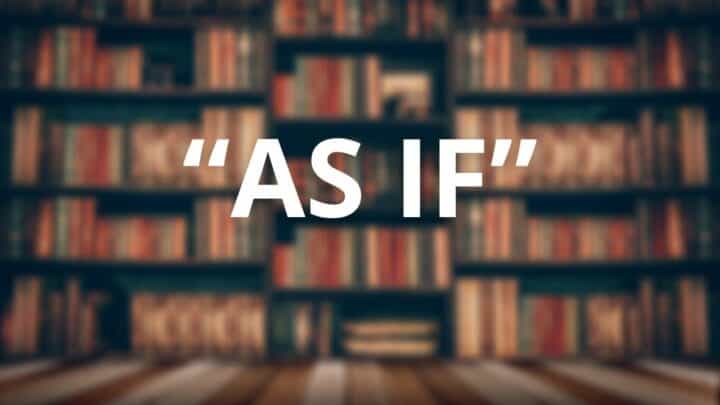The Hollywood hit movie, Clueless, is probably responsible for introducing ‘as if’ as an idiom into the English vernacular.
In the mid-1990s coming-of-age film, with a massive cult following, the main character uses the phrase,
“Ugh! As if!” to indicate contempt, without regard for grammatical correctness.
The phrase however entered into the pop culture of the day, and came to represent the attitude of that generation.
In the early 2000s, the British produced a television series, set in London, entitled, ‘As If’. More than seventy episodes were aired, over a four-year period.
Following the popularity of the English series, American filmmakers followed suit. Of the seven episodes filmed, only two were aired.
The sentiment seemed to have lost public appeal across the pond.
What does the phrase ‘as if’ mean?
‘As if’ is used as a comparison or as an expression describing what something or some action appears to be. It is most often used to exaggerate or to compare the present situation to unlikely scenarios. It is equivalent to ‘as though’ and ‘like’, in different contexts. Generally, the phrase is used as a conjunction between two clauses in a sentence.
There are a number of common uses for the phrase which each have an affect in the way the subordinate clause is written.
Firstly, it is used to express a hypothetical situation, in which case the past subjunctive verb tense, ‘were’, is used.
Secondly, when the phrase is used to describe a possible or likely situation, the verb tense depends on the timeline.
‘As if’ can also be used to express an opinion and as an idiom.
How do you use ‘as if’ in a sentence?
As a conjunctive in a hypothetical situation
The second clause is adverbial in that describes how ‘he paraded’. It is also stated in the past subjunctive tense because it not a real situation, i.e. he is not about to be crowned emperor.
The second clause cannot stand on its own in a sentence in that form, it is therefore a dependant or insubordinate clause.
The verb ‘were’ is used regardless of the nature of the subject.
In the sentences above, the phrase ‘as though’ could be used instead of ‘as if’ but this has become less common practice in recent times.
As a conjunction in a likely or probable scenario
The second clause can stand alone as a sentence: ‘She has (or had) been running an ultra marathon.’
Expressed as an opinion
There are a limited number of verbs that can be used in the first clause which indicate that what is being expressed is an opinion.
Because the situation described in the second clause is feasible, it can stand alone as a sentence, e.g. ‘He stole the money.’
In the sentences above, the word ‘like’ would probably be a more commonly used option in recent times, e.g.
As an idiom
‘As if’ can be used as a stand alone phrase even though it breaks the long-held rules of English grammar. In this form it usually expresses an unlikely situation.
Person A: Do you think you will succeed at beating the champion tomorrow night?
Person B: As if!
In this context Person B is expressing doubt that the result is possible. To complete the thought, Person B could say: ‘As if that were likely!’ This is still an incomplete sentence however.
In this context, the expression is used to describe a highly improbable situation or outcome.
In the film clueless, ‘as if’ was used in this form.
What Cher actually meant to say when approached by random unwelcome suitors, was, “As if I were attracted to you!”, or more plainly stated, “Loser!”.
As an expression of dire circumstances
‘As if’ can be used to prefix a clause that sketches an undesirable situation.
Common expressions prefaced by ‘as if’
These phrases all tend to express hyperbole, or exaggerated comparisons.
This means she showed little regard for the future consequences of eating the pancakes. She showed greed and a disregard for the effect it would have on her physique.
Note the use of the subjunctive verb, indicating that this is a hypothetical situation. It is assumed that there will always be a tomorrow.
This means that Anthony spends money faster than would be considered normal.
Once again he is doing so with little regard for the consequences, especially given that the money is not his own.
It also implies that his spending is excessive and possibly out of control.
The expression likely stems from the need to consume or dispose of an item before it is no longer desirable or useful.
From the verb used in the second clause, the reader can discern that it is unlikely that money will be going out of fashion any time soon.
The athlete put the maximum effort into his participation in the race, possibly in order to live up to his reputation. Here, the writer is not discounting that his life did depend on it.
In the child’s mind, the situation is dire. She has been denied her desires and nothing can compare to this moment in terms of drama or catastrophe.
She sees no future because she has been denied a toy. Spare a thought for the parents.

Hey fellow Linguaholics! It’s me, Marcel. I am the proud owner of linguaholic.com. Languages have always been my passion and I have studied Linguistics, Computational Linguistics and Sinology at the University of Zurich. It is my utmost pleasure to share with all of you guys what I know about languages and linguistics in general.

